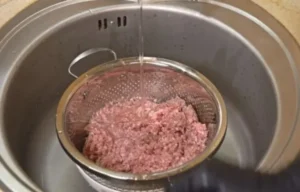Does Ground Beef Need to Be Rinsed? Examining Benefits and Drawbacks
There’s a common topic in the kitchen when it comes to cooking ground beef: should the meat be rinsed before or after cooking? Home cooks have been divided over this decision for years, with good reasons on both sides. It seems like a straightforward choice. To assist you in selecting the approach that best suits your cooking style and taste preferences, let’s examine this culinary conundrum.
Advocates of Rinsing as a Fat-Reduction Technique

Rinsing ground beef is something that some home cooks really believe in, especially before cooking. What drives them most? lowering the meat’s fat percentage. Rinsing the beef under cold water could seem like the perfect answer for anyone watching their calorie consumption or who like a less fatty feel in their meals.
When cooking ground beef with higher fat percentages (such as mixes like 70/30 or 80/20), a significant amount of rendered fat may remain in the pan. Rinsing the beef seems like a simple solution for people who are health conscious or don’t enjoy greasy food. These chefs think they’re making a healthier, leaner dish by removing the fat before cooking.
For this reason, those who want to lose fat but don’t want to buy thinner ground beef pieces can choose to rinse in order to meet their nutritional requirements. As with most cooking techniques, there is a cost associated with it.
Reluctant Rinsing Supporters: Taste at Risk
Although washing ground beef may reduce its fat content, others contend that flavor is also lost in the process, in addition to the grease. Meat gains flavor and richness from its fat content; eliminating it will result in dry, tasteless beef.
The fat content in ground beef contributes significantly to its flavor, enhancing the meat’s inherent richness and juiciness. Not only do you cut calories when you wash off the fat, but you also take away the moisture that keeps the meat juicy and tasty. Rinsing can leave food with an unsatisfactory texture and bland flavor profile, especially for meals like burgers, tacos, or meat sauces that depend on the savory flavor of ground beef.
For these reasons, instead of washing the beef after cooking, many chefs advise draining any surplus fat. With this method, you can control the amount of grease without losing the flavor and juiciness that fat adds.
The Disarray and Plumbing Problems: A Useful Concern
Apart from the controversy over flavor and fat content, there’s also a practical reason not to rinse ground beef: possible mess and plumbing issues. Rinsing ground beef with water can cause grease to spray throughout your kitchen, making cleanup more challenging. The problem of fat seeping into your drain, however, is far more worrisome.
Plumbing problems might arise when fat is poured down the drain. The fat solidifies when it cools, which could clog your pipes and result in poor drainage or even expensive repairs. A better way to prevent this is to let the fat cool and harden on a plate or in a container. It’s easy to dispose of after it hardens, keeping your dish’s grease level under control and lowering the possibility of plumbing issues.
Striking a Balance: Other Approaches
There are additional techniques you might attempt if you’re caught between the requirement to maintain flavor and the need to cut fat. For instance, you may cook the ground beef and then, without washing the meat, drain the extra fat from the pan. This enables you to maintain the dish’s deep flavor while cutting down on the amount of grease.
Selecting leaner ground beef cuts, such the 90/10 or 93/7 types, is an additional choice as they have a substantially lower fat content in the first place. You won’t feel the need to rinse or drain as frequently when cooking with these cuts because they naturally produce less grease.
Concluding Remarks: Individual Decision Making
The choice to rinse ground beef is ultimately a personal one. Depending on your personal preferences, you may choose to reduce fat for health reasons or preserve flavor for the ideal dish. You should expect to lose some of the flavor and texture of your ground beef if you choose to rinse it. However, there are still several ways to control the fat content without sacrificing flavor if you decide against rinsing.
The next time you use ground beef in a recipe, weigh the benefits and drawbacks of each method. Try out various techniques and choose one suits your palate the best. The important thing is to savor the food that best fits your palate and health objectives, whether you’re preparing a flavorful pasta sauce or a juicy burger.
Have fun in the kitchen!


